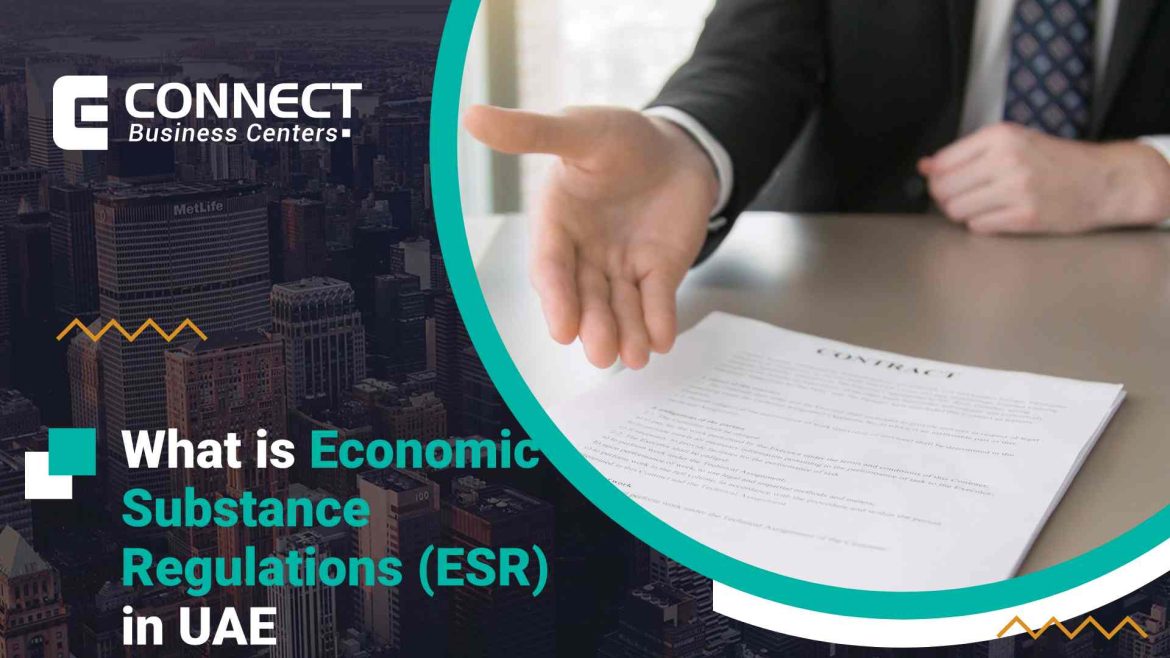
The Economic Substance Regulations UAE are guidelines that oversee the economic activities of companies. These regulations aim to protect consumers and prevent fraudulent company practices. The rules also have to protect investors and prevent companies from engaging in illegal activities. Additionally, the MOF ESR exists since April 2019, in response to an assessment of the UAE’s fiscal framework.
In this article, we will explain what is ESR in UAE and how it affects companies. Especially, those that carry out the specific relevant activities in the regulations. We will show you the compliance requirements and obligations that entities subject to the regulations must follow. In addition, the possible sanctions for non-compliance. We will also give you some tips to demonstrate an ideal economic presence in the UAE. Of course, about the activities you do.
How Economic Substance Regulations in UAE? Works

Among the functions of the Economic Substance Regulations UAE are the following:
Notification: All entities in the UAE that have one of the relevant activities as their function must submit a notification. This has to be done within six months of the end of the financial year (FY). For this, you have to log in to the online ESR portal of the Ministry of Finance (MoF). As part of this presentation, entities have to disclose the relevant activities that were carried out.
Specifically, whether there is any income from there and whether that income is subject to tax outside the UAE. For entities with multiple branches in the UAE, you only need to submit one consolidated notification.
Economic Substance Tests: Entities in the UAE with income from activities have to demonstrate adequate substance. Of course, it has to be about said activities meeting the requirements of three Economic Substance tests (ES Tests). Below, you will see what these requirements are.
- Basic income generating activity (CIGA) test: Requires the main activities carried out in the UAE.
- Directed and managed test: Requires that the company be directed and managed from the UAE about the Relevant Activities.
- Adequacy test: Requires evaluation of ideal resources in the UAE. For instance, expenses, assets, and employees.
Reports: Entities with income from any of the relevant activities must submit a report. This report has to be submitted to the Ministry of Finance’s online Economic Substance Regulations UAE. You have a period of twelve months following the end of the relevant fiscal year. Entities have to disclose different details in these reports. For instance, whether or not you passed the ES tests, details of providers, specific CIGA details.
Who is subject to the Economic Substance Regulations?
There are different categories of business entities that come under the ambit of the UAE ESR. The classification of these is the term licensee and there are two types of licensees. One is the typical licensee who must comply with ESR requirements and exempt licensees.
In this way, entities will be classified as licensees if:
- A corporation without legal personality or a legal entity within or outside the state.
- The company with registration in the United Arab Emirates, including the free zone/financial free zone.
- Possess a legal license, permit, or other form of approval to conduct business.
- That they carry out relevant activities.
On the other hand, an exempt licensee refers to a licensee exempt from reporting economic substances for certain reasons. An exempt licensee is a licensee who has the following:
- Investment fund.
- Tax resident in a jurisdiction that is different from that of the UAE.
- An entity that is wholly owned by UAE residents is not part of a multinational group. In addition, it has activities only carried out in the UAE.
- Branch of a foreign entity and its relevant income subject to tax in a different jurisdiction.
However, you can find other practical cases to the aforementioned. For this reason, you must seek expert guidance or the help of a business center.
What is required under the Economic Substance
If you want to start a business, you must know about this. Thus, an entity that is not a controlling entity and entities that carry out intellectual property business, for which there are different criteria; If they carry out a relevant activity, they will meet the economic substance requirements if:
- It is managed and directed in the jurisdiction.
- Basic income-generating activities are carried out in the jurisdiction of the activity that is relevant.
- Maintains premises that are physically adequate in the jurisdiction.
- There are suitable employees in the jurisdiction and they have adequate qualifications.
- You incur expenses that are appropriate in the jurisdiction in respect of the relevant activity.
- Submits a confidential report of economic substance annually to the applicable authority in your jurisdiction. This will help the authority evaluate compliance.
Those relevant entities that act as pure equity holding vehicles are subject to a less onerous compliance test. Furthermore, those who carry out intellectual property activities; particularly high-risk intellectual property businesses, are subject to a stricter test.
For this reason, it is important to know the UAE economic substance regulations or look directly at the Ministry of Finance ESR.
Defining Rules and Regulations
The Economic Substance Regulations UAE are a group of regulations issued by the UAE government. In this way, there is a guarantee that companies operating in the country can have a sufficient economic presence. For this reason, companies with registration in the UAE, and carry out any of the following relevant activities, must maintain and demonstrate an adequate economic presence:
- Banking
- Insurance business.
- Investment fund management business.
- Financial leasing business.
- Headquarters business.
- Shipping business.
- Intellectual property business.
- Distribution and service center business.
In this way, the Economic Substance Regulations are applied to financial years beginning on or after January 1, 2019. For this reason, companies that are within the scope of the regulations must submit an annual notification form. This should be done to your regulatory authority.
Additionally, they must complete and submit an economic substance report to the same regulatory authority. All of this within 12 months of the end of your financial year.
Core Compliance Responsibilities
Basic ESR compliance responsibilities in the UAE include:
- They must maintain an adequate economic presence in the UAE about the activity they carry out.
- Submit a notification form annually to your regulatory authority.
- They must complete and submit an economic substance report to the same regulatory authority. All of this, within 12 months of the end of your financial year.
Failure to comply with these regulations may result in penalties. In addition, spontaneous exchange of information with foreign competent authority. You may also suffer administrative sanctions such as suspension, revocation, or non-renewal of your UAE business license or entity permit.
Entity-Specific Mandates
The Economic Substance Regulations UAE includes several specific mandates, which you will see below.
Cabinet Resolution No. 31 of 2019: It is about the specification of the Requirements of real Economic Activities.
Ministerial Decision No. 215 of 2019: It is about the issuance of Directives for the implementation of the Provisions of Cabinet Decision No. 31 of 2019.
Cabinet of Ministers Resolution No. 57 of 2020: This determines the Economic Substance Requirements.
Ministerial Decision No. 100 of 2020: It is about the Issuance of Guidelines for the Implementation of the provisions of Cabinet Decision No. 57 of 2020. That is, about the requirements of economic substances.
Comprehending Criteria for Substance Testing
In the UAE, the economic substance test aims to evaluate the important objectives of the company. You have to know that the tests differ for different types of companies.
For this test, companies have to meet the following criteria:
- The relevant activities are directed and managed by the licensee from the UAE.
- Basic income-generating activities (CIGA) must be carried out in the UAE. You have to keep in mind that each relevant activity has a different CIGA set.
- Finally, the entrepreneur has to have enough employees, operating expenses, and physical assets in the UAE.
To evaluate whether operating expenses and physical assets are ideal, sufficient and accurate records must be maintained for verification. The National Appraisal Authority has to review such records and other supporting documentation to decide.
Standards for Documentation and Reporting
Generally, an ES report must include the following information
- Relevant activity
- Type of income and amount of work on the relevant activity.
- Type and amount of expenses concerning the relevant activity.
- Assets according to the UAE to carry out the relevant activity,
- The number of full-time local employees with sufficient skills to carry out the relevant activity.
- Other details that the law requires.
On the other hand, intellectual property companies are somewhat risky, and require more information:
- The experience, qualifications, and contracts of real-time employees. Specifically, those who permanently reside in the country and carry out relevant activities in the UAE.
- Evidence of business decisions.
- Finally, these businesses have to provide sufficient information to demonstrate that the entrepreneur exercises a high degree of control over the company. Specifically, on the exploitation, development, maintenance, protection, and improvement of intellectual property assets.
According to the Economic Substance Regulations UAE, licensees have to submit an ES report from time to time. That is, within 12 months after the end of the financial year. It is important to ensure compliance with ESR standards. Otherwise, you will have to give rise to severe sanctions.
Challenges and Pitfalls in Compliance
Compliance with the UAE Economic Substance Regulations (ESR) can present difficulties and challenges. According to the Ministry of Finance of the UAE, certain companies have to maintain and demonstrate an ideal economic presence in the company’s activities. This is for companies on the mainland and in free zones of the UAE that carry out any of the relevant activities.
Companies that do not comply with regulations may face sanctions. Specifically, the spontaneous exchange of information with the Foreign Competent Authority. In addition, other administrative sanctions. For instance, the revocation, suspension, or non-renewal of the entity’s business license or permit.
It is important to highlight that compliance with the UAE Economic Substance Regulations is a complex and constantly evolving issue. Therefore, a good recommendation is that companies have professional advice. Thus, they can guarantee ideal compliance with regulations.
Failure to comply with the Economic Substance Regulations UAE may result in different sanctions. For instance, licensees who do not submit a notification have to pay AED 20,000. Additionally, a fine of AED 50,000 must be submitted if licensees commit any of the following violations.
- Failure to present the SE report with the essential documentation.
- Failure to pass the ES test for each relevant financial year.
Finally, if the licensee continually commits the same infringement in the following financial year he has to pay a fine. This is a total of 400,000 AED.
Conclusion
In short, ESRs are a set of regulations that are issued by the UAE government. In this way, they can guarantee that all companies in the country can have a sufficient economic presence. Companies that are registered in the UAE and carry out one of the relevant activities mentioned above must maintain and demonstrate their adequate economic presence.
Additionally, failure to comply with these regulations may result in several penalties. In this way, you may suffer administrative sanctions such as the suspension, revocation, or non-renewal of your business license. Greatly affecting the entity that committed the infraction. For this reason, you must take into account all these regulations and avoid future problems with your company.

